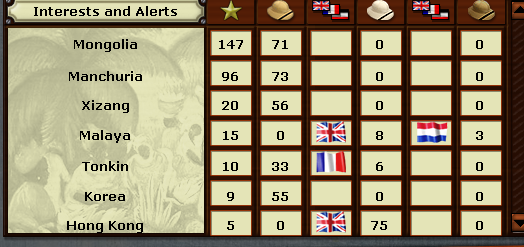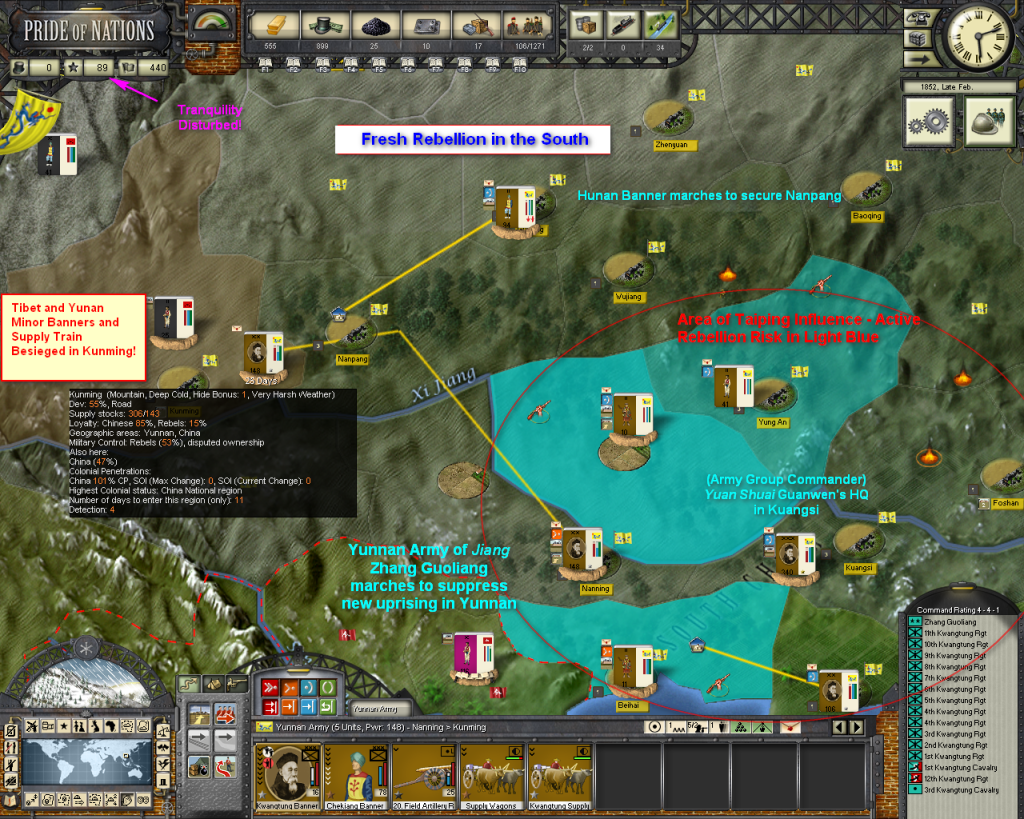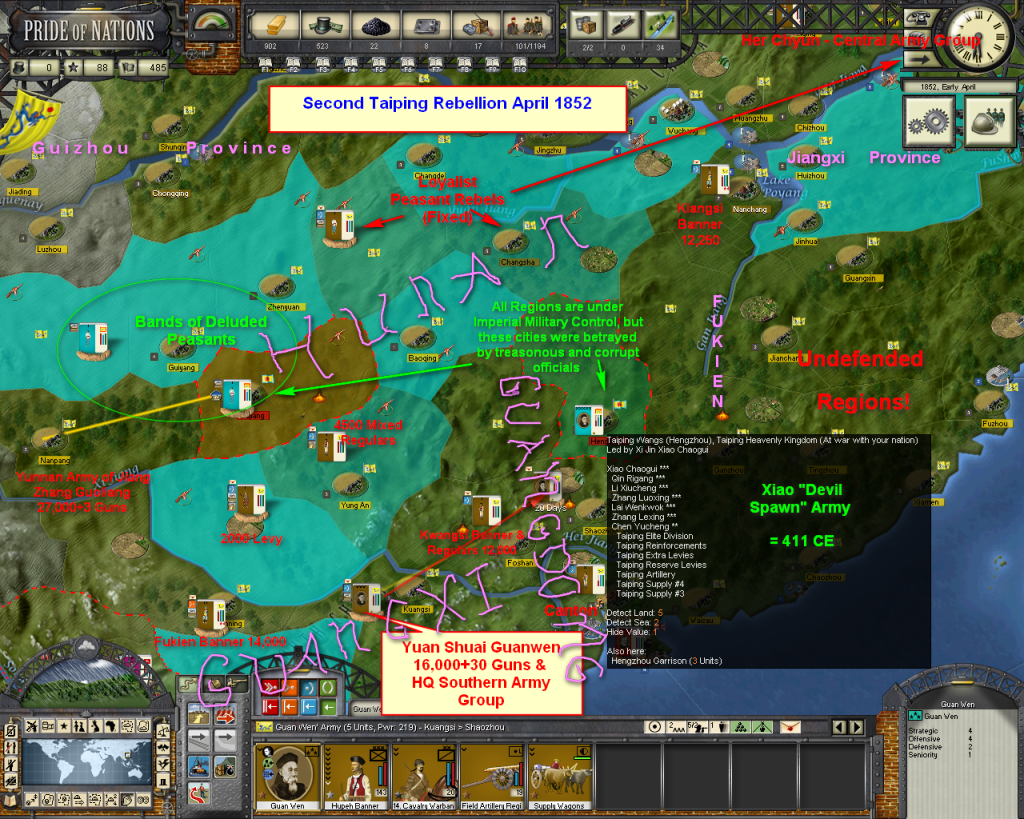Played starting with PON Patch 1.01m using SwitchFaction.
China - a “sleeping giant” - huge, populous, but weak and somnolent under the rigid social stratifiation of Manchu rule. It has great potential, someday, if modernized and developed beyond its disabilities. The Qing dynasty was loathe to risk the disruptive effects of massive change on their authoirty, but players may be more ambitious. The question is how they can do.
ASSESSMENT:
NATIONAL ATTRIBUTES: China is technically Backward with an Education system limited to screening and educating the ruling class of a Rigid Elitist social structure in the refinements of ancient Chinese culture, and a political system proficient in rampant corruption, only facilitated by the opportunities offered by a State-Controlled economy. As the center of its world, it is introspective beyond keeping its ring of tributary vassal states in line. The dangers of foreign influences are contained by a policy of highly restricted trade, which provides the government the benefit of being able to assert high taxes and tariffs, though they may be unable to collect them all.
A religion and ideology that has lasted millennia mandates obedience and compliance to the requirements of the Empire, and Ruthless enforcement is used against opposition. Large armies of levies, both tribesmen and native Han Chinese, provide the means to maintain the regime against unrest, although the army is relatively feudal in character an badly equipped by modern standards.
RULER: The Xianfeng Emperor is all skill 5, avoiding some of the restrictions on diplomatic and colonial actions that that plague other countries.
DIPLOMACY: Diplomats are remarkably few considering the sophistication of Chinese administration and relations with its neighbors - 2 per semi-annual class, with a maximum pool of 5. It will be hard to maintain approriate relations with its neighbors neighbors since this is only enough to keep 2 Local Supports active on a rolling permanent basis. Defensive Treaty costs almost a year of Diplomats but lasts so must be the goal.
GEOPOLITICAL SITUATION AND GOALS: China’s name means “Middle Kingdom,” which defines its strategic viewpoint. Changes of dynasties did little to change the view of its surrounding neighbors as either vassals or enemies – never as equals. Maintaining stability within the country and its colonial regions and dominance over the vassal ring is the priority – vassals were given the valuable privilege of sending trade embassies to the Emperor which is sort of represented in game by Merchants.
China has extensive claims on non-national regions in most directions. Some of the claimed areas are directly controlled, while others are not. In the game, China can assert its claims either by conquest or by turning these areas into vassals. Indeed, China’s Colonial options are very limited and are tailored for this purpose: Merchants, Pacification, Retaliation and Create Vassal. Merchants can raise Colonial Penetration up to 35 (China is not able to do the normal Trading Post follow-up since traders came to China, not the other way around. Pacification can slowly raise CP (among other effects) between 10 and 50. A Vassal relationship can be created at 50 CP in the capital and an average of 35 CP elsewhere (more stringent than a Western Protectorate’s CP requirements. Since Pacification requires the region be China’s or allied, a peaceful approach to Vassalage requires an alliance to raise CP sufficiently. Retaliation is a tool for brutally crushing revolts that is useless for vassalization. Colonial and military efforts are interesting to play, but must beware of excessive diversion of resources to these.
China starts in alliance with Korea, its historical “little brother” vassal state, with troops in its territory and potential access to its resources.
Japan is a quiet onetime vassal (but a troublesome one), closed off to the world at present but to watch for the future. The British have seized Hong Kong. They must be watched. They cannot be trusted. But they can be cultivated economically.
The French in Cochin China have an interest in the entire Theater, and are a threat to the historical friendly states of Annam and Tonkin. China as a matter of Imperial honor should protect these states, even if it is necessary to occupy them.
Russia, however, is the largest threat – actively colonizing through Siberia to the coast and even settling in Chinese-controlled regions around the Amur. China holds the capital region but can’t establish Vassal status in the Amur area since the CP average is not high enough due to the number of Russian controlled regions with little of no Chinese CP. It may come to crisis, or even war, but should the Celestial Emperor fear the barbarians whose boasting loud in their own ears in the remote darkness is but a meaningless murmur in the Middle Kingdom.
COLONIAL ACTIONS: China has extensive claims outside its national territory. Much of the claimed territory is already controlled, but some lies in neighboring countries. China’s Colonial Actions however are limited to: Merchants, Pacify, Retaliate (lowers CP), and Declare Vassal. Vassal is like Protectorate but with 50 CP min in the capital and 35 rather than 25 average, longer duration, and twice as expensive in money though the card only says 75 money. It has same CP change as Protectorate, but no cap, and smaller revolt risk reduction but no minimum.
Merchants start the CP process and work up to 35. Pacify works from 10-50 CP at 2 per and, like Retaliate, requires China or ally own the region. Retalitate additionally requires active revolt. How to get to Vassal level? Obtain a Defensive Alliance for a costly 4 diplomats and then Pacify repeatedly? War to obtain control that allows raising CP, or just take it over?
I think a slight change in Diplomat totals and Colonial Actions is in order.
ECONOMY: China has a large population that includes many cities acting as collection points and some useful navigable rivers as well as the coast. Riverine units can be built that facilitate riverine and coastal movement. Its provinces generally have Roads or Tracks, and many are flat – allowing cheaper construction. The starting economy consists of
- 2 manufactories for a total of 4 Mfg Goods (in Peking and Canton),
- 1 Iron production (which should be expanded) to support the Mfg Goods production,
- a little Craftsmen Steel, Minerals, and Nitrates, which may be sold
- Coal produced for domestic or foreign sale
- Silk for export (since there is zero domestic luxury consumption demand)
- Tea for domestic or foreign sale as a common good,
- Rice for food and possibly export – a monotonous diet that should be supplemented.
Other resources that can be developed include:
- Food: Cattle, Fish, and Cereals – and more Rice.
- Common: Cotton/Wool and Wood.
Silk brings a good price and should be the priority at first, but as the plantations require a lot of Private Capital an Iron Mine is the most prudent initial construction, and others like Cereals production help add food diversity. Unless planning tech spending or a war early on, State Funds are ample and taxes may be cut to leave more Private Capital to grow. Manufactured Goods are required to build almost everything, so should be hoarded for the day of need or when industrial factories are allowed.
China does not have a merchant fleet, and I’m not sure which tech leads to that so don’t know how long it might be before it gets one. Meanwhile it trades with those who are attracted by the products on offer.
MILITARY: Although China’s power rating is in the middle of the F10 Great Powers ranking, its forces are weak, lack much firepower, and the transportation and logistics infrastructure for effective campaigning cross-country. One advantage of massed levies is the low cost of replacements and the Command Point cost of its Units (e.g., a corps-equivalent “banner” is 2 CmdP). Little can be done to improve things without economic and technological development, which will be slow.
China - a “sleeping giant” - huge, populous, but weak and somnolent under the rigid social stratifiation of Manchu rule. It has great potential, someday, if modernized and developed beyond its disabilities. The Qing dynasty was loathe to risk the disruptive effects of massive change on their authoirty, but players may be more ambitious. The question is how they can do.
ASSESSMENT:
NATIONAL ATTRIBUTES: China is technically Backward with an Education system limited to screening and educating the ruling class of a Rigid Elitist social structure in the refinements of ancient Chinese culture, and a political system proficient in rampant corruption, only facilitated by the opportunities offered by a State-Controlled economy. As the center of its world, it is introspective beyond keeping its ring of tributary vassal states in line. The dangers of foreign influences are contained by a policy of highly restricted trade, which provides the government the benefit of being able to assert high taxes and tariffs, though they may be unable to collect them all.
A religion and ideology that has lasted millennia mandates obedience and compliance to the requirements of the Empire, and Ruthless enforcement is used against opposition. Large armies of levies, both tribesmen and native Han Chinese, provide the means to maintain the regime against unrest, although the army is relatively feudal in character an badly equipped by modern standards.
RULER: The Xianfeng Emperor is all skill 5, avoiding some of the restrictions on diplomatic and colonial actions that that plague other countries.
DIPLOMACY: Diplomats are remarkably few considering the sophistication of Chinese administration and relations with its neighbors - 2 per semi-annual class, with a maximum pool of 5. It will be hard to maintain approriate relations with its neighbors neighbors since this is only enough to keep 2 Local Supports active on a rolling permanent basis. Defensive Treaty costs almost a year of Diplomats but lasts so must be the goal.
GEOPOLITICAL SITUATION AND GOALS: China’s name means “Middle Kingdom,” which defines its strategic viewpoint. Changes of dynasties did little to change the view of its surrounding neighbors as either vassals or enemies – never as equals. Maintaining stability within the country and its colonial regions and dominance over the vassal ring is the priority – vassals were given the valuable privilege of sending trade embassies to the Emperor which is sort of represented in game by Merchants.
China has extensive claims on non-national regions in most directions. Some of the claimed areas are directly controlled, while others are not. In the game, China can assert its claims either by conquest or by turning these areas into vassals. Indeed, China’s Colonial options are very limited and are tailored for this purpose: Merchants, Pacification, Retaliation and Create Vassal. Merchants can raise Colonial Penetration up to 35 (China is not able to do the normal Trading Post follow-up since traders came to China, not the other way around. Pacification can slowly raise CP (among other effects) between 10 and 50. A Vassal relationship can be created at 50 CP in the capital and an average of 35 CP elsewhere (more stringent than a Western Protectorate’s CP requirements. Since Pacification requires the region be China’s or allied, a peaceful approach to Vassalage requires an alliance to raise CP sufficiently. Retaliation is a tool for brutally crushing revolts that is useless for vassalization. Colonial and military efforts are interesting to play, but must beware of excessive diversion of resources to these.
China starts in alliance with Korea, its historical “little brother” vassal state, with troops in its territory and potential access to its resources.
Japan is a quiet onetime vassal (but a troublesome one), closed off to the world at present but to watch for the future. The British have seized Hong Kong. They must be watched. They cannot be trusted. But they can be cultivated economically.
The French in Cochin China have an interest in the entire Theater, and are a threat to the historical friendly states of Annam and Tonkin. China as a matter of Imperial honor should protect these states, even if it is necessary to occupy them.
Russia, however, is the largest threat – actively colonizing through Siberia to the coast and even settling in Chinese-controlled regions around the Amur. China holds the capital region but can’t establish Vassal status in the Amur area since the CP average is not high enough due to the number of Russian controlled regions with little of no Chinese CP. It may come to crisis, or even war, but should the Celestial Emperor fear the barbarians whose boasting loud in their own ears in the remote darkness is but a meaningless murmur in the Middle Kingdom.
COLONIAL ACTIONS: China has extensive claims outside its national territory. Much of the claimed territory is already controlled, but some lies in neighboring countries. China’s Colonial Actions however are limited to: Merchants, Pacify, Retaliate (lowers CP), and Declare Vassal. Vassal is like Protectorate but with 50 CP min in the capital and 35 rather than 25 average, longer duration, and twice as expensive in money though the card only says 75 money. It has same CP change as Protectorate, but no cap, and smaller revolt risk reduction but no minimum.
Merchants start the CP process and work up to 35. Pacify works from 10-50 CP at 2 per and, like Retaliate, requires China or ally own the region. Retalitate additionally requires active revolt. How to get to Vassal level? Obtain a Defensive Alliance for a costly 4 diplomats and then Pacify repeatedly? War to obtain control that allows raising CP, or just take it over?
I think a slight change in Diplomat totals and Colonial Actions is in order.
ECONOMY: China has a large population that includes many cities acting as collection points and some useful navigable rivers as well as the coast. Riverine units can be built that facilitate riverine and coastal movement. Its provinces generally have Roads or Tracks, and many are flat – allowing cheaper construction. The starting economy consists of
- 2 manufactories for a total of 4 Mfg Goods (in Peking and Canton),
- 1 Iron production (which should be expanded) to support the Mfg Goods production,
- a little Craftsmen Steel, Minerals, and Nitrates, which may be sold
- Coal produced for domestic or foreign sale
- Silk for export (since there is zero domestic luxury consumption demand)
- Tea for domestic or foreign sale as a common good,
- Rice for food and possibly export – a monotonous diet that should be supplemented.
Other resources that can be developed include:
- Food: Cattle, Fish, and Cereals – and more Rice.
- Common: Cotton/Wool and Wood.
Silk brings a good price and should be the priority at first, but as the plantations require a lot of Private Capital an Iron Mine is the most prudent initial construction, and others like Cereals production help add food diversity. Unless planning tech spending or a war early on, State Funds are ample and taxes may be cut to leave more Private Capital to grow. Manufactured Goods are required to build almost everything, so should be hoarded for the day of need or when industrial factories are allowed.
China does not have a merchant fleet, and I’m not sure which tech leads to that so don’t know how long it might be before it gets one. Meanwhile it trades with those who are attracted by the products on offer.
MILITARY: Although China’s power rating is in the middle of the F10 Great Powers ranking, its forces are weak, lack much firepower, and the transportation and logistics infrastructure for effective campaigning cross-country. One advantage of massed levies is the low cost of replacements and the Command Point cost of its Units (e.g., a corps-equivalent “banner” is 2 CmdP). Little can be done to improve things without economic and technological development, which will be slow.




